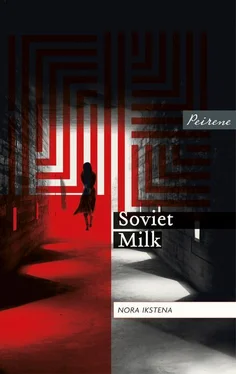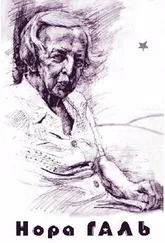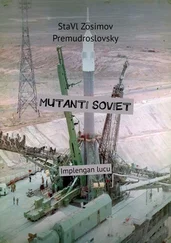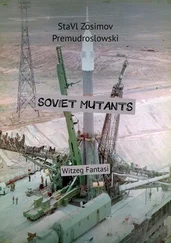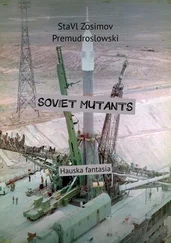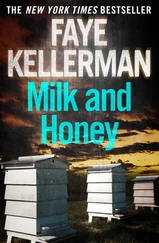After receiving our report cards, we got ready for a carnival. Uncharacteristically, my mother decided to join in. She mixed some dyes in a pail, tied knots in the corners of a sheet and soaked it. When it was dry, she folded the sheet in half, sewed up the sides, cut out a hole at the top, and the result was an unusual and splendid sack dress. Then she sat me down near the kitchen window and, pulling a few things from her nearly empty cosmetics bag, she began to make me up. We rarely touched each other. Yet now her fingers slid over my forehead, she patted down my nose and cheeks, gave finishing touches to my eyelids, chin and eyebrows. Her hands and clothes smelled of medicine, which was my mother’s usual fragrance. That smell, along with her touch, awakened in me a love I had not felt before: love for my mother.
When she handed me the mirror, a child’s face glared back at me that was divided between good and evil. The fearful grimace on one side was set off by a black furrow that ran from my nose to my chin and a still-blacker eyebrow. The other side was as if sprinkled with gold powder, bright with a happy mouth, its corners turned up. ‘Who am I?’ I asked my mother. ‘A split personality,’ she replied. In school, getting lost in a crowd of elves, rabbits, squirrels, Snow Whites and gingerbread men, I felt myself admired. I did not win the prize for the best costume, but in my heart I felt that the Split Personality had won.
Joyfully, I ran home in the late evening. Maybe my mother would be waiting and dinner would be ready. The next day I would be leaving for two weeks. I wanted to put my arms around her neck and kiss her in thanks for this beautiful carnival, for the Split Personality, which she had conjured up like a miracle worker.
Outside the house a frenzied dog was waiting for me instead. Inside was dark and cold. Neither the pot-bellied stove nor the cooking stove had been fired up. From the corridor, I could hear strange wheezing. My mother was lying in bed, beside her a bottle of alcohol and some white tablets. Around her neck was an old man’s necktie, with which she had tried to strangle herself. I rushed to her, tore off that damned necktie and propped her up. She choked and coughed, then vomited up a liquid with more of those white tablets floating in it. All night I brewed tea for her. She obediently drank it, and vomited now and then. When she fell asleep, I crawled in beside her. I slept, hardly breathing, my head pressed to her left breast, to be sure that her heart was still beating.
*
Serafima didn’t come to see me for at least a week. I didn’t look for her. Larisa Nikolayevna told me that Serafima’s husband was in hospital. A drinking buddy had attacked him in the stairwell. Otherwise everything was peaceful. We continued our research at the Institute. The first snow of winter left a thin layer of white on the bumpy pavements and the shabby rooftops. The Neva had not yet frozen over. Edged in white, the bridges looked romantic. Christmas was just around the corner and I recalled the windows in our old Riga flat covered with heavy blankets, my mother lighting candles on the tree and, with my stepfather, quietly, practically whispering, singing the carol:
Es skaistu rozīt’ zinu
No sīkas saknītes,
Tā rozīt’, ko es minu
No Jeses cēlusies…
Lo, how a rose e’er blooming
From tender stem hath sprung
Of Jesse’s lineage coming,
As men of old have sung…
Celebrating Christmas was prohibited. The Christian holiday was replaced by fireworks, by the many clocks on the Kremlin chiming in the New Year, and an announcer’s voice proclaiming in Russian, ‘S novym godom, tovarishchi! S novym schastyem!’ – ‘Happy New Year, comrades! Here’s to new happiness!’
I walked along the snow-covered Neva bridge and quietly sang, ‘Es skaistu rozīt zinu.’ We all used to think that Jesse in this hymn meant Jesus. Such a miraculous story, believable only if one had faith. My mother and my stepfather had never talked about Jesus. I read about him in the old professor’s books, the ones I had lugged up to my room from the pile discarded in our yard.
But medicine had outpaced Jesus. Everything was explicable and understandable. There was no need for faith. And Jesus had been prohibited. In His place, we were to believe in a real ‘lotus-land’ – that is, in Communism, under which everything would belong to everyone and euphoria would reign. For the time being, nothing indicated that this had been achieved. Already thirty years had passed since the war, but no one was complaining. The words of a Soviet song fitted our idyllic view of the world:
Varen plaša mana zeme dzimtā, lauki, meži, saules staru plīvs. Un es nezinu starp zemēm simtām, kur vēl citur cilvēks ir tik brīvs.
Mighty vast my land of birth, its fields and forests, rippling sunbeams. Of hundreds of other lands, I don’t know anywhere man can be so free.
But for a short while Jesse – Jesus – lifted me away from this, my destined time and place, away from the life into which I had mistakenly been born. My birth obliged me to be alive: an absurd happenstance. There were so many who more than anything had wished to live but hadn’t been born. Who decided this?
That evening I noticed that my women colleagues were oddly quiet and reserved with me. The usual joking around and tall stories were missing. Missing too were our usual evening drinks. The next morning I learned why. In the corridor two men dressed identically were waiting for me. I had to leave the Institute without delay to return to Riga and there meet with my head doctor.
Crying, Larisa Nikolayevna helped me to pack. I described the men to her. I confessed that it was I who had beaten Serafima’s husband. And that I didn’t regret it. Larisa Nikolayevna was convinced that this was the last time she would ever see me and that I would be arrested on the train or possibly at Riga’s railway station.
I was surprised how calm and fearless I felt. So this was what the end of the road would be like. No one was waiting for me at the station. I took my place in a second-class carriage, where the passengers were already unpacking their bundles of hard-boiled eggs, bread, sausage and pickles. The attendant was jangling glasses of tea in their filigree metal holders. As the train began to move, savoury aromas wafted about and I politely refused several offers of food. When all grew quiet, the aroma of food gave way to that of sweat. I walked out into the corridor to smoke. The train sped along and the night sped with it. This might be the last free night of my life. It was taking me back to my tenuous roots – to my mother, my stepfather and daughter. I had betrayed them. I was returning as one driven away, sooner or later to be stoned. I hoped they would arrest me at Riga station and so save me from confronting my family.
On returning to my seat, I slept for a brief while. The din of the train rocked me. In my dream I saw my father. The newspapers that always littered his room had been organized into a large black-and-white cross. He lay there with his eyes open, breathing in and out heavily. I approached him and said, ‘Close your eyes, you’re dead.’ He continued to breathe, wordlessly confirming that he was alive.
At Riga station too I found no one waiting for me. A holiday mood was in the air. Spruce trees were being sold in the station square. I took the third tram to reach my meeting with the head doctor. Riga seemed like a dishonoured young girl, her head hung low in the tranquil, late-December air. People in long queues outside shops shifted from foot to foot. On a corner mandarins were being sold. The lucky ones got to buy them by the kilogram. The year 1977 was giving way to 1978. On festive tables you would be sure to find potato salad and sausage, and Sovetskoye shampanskoye – Soviet champagne. Life trapped inside this bubble would keep on at its established pace. I was hoping they would arrest me at the head doctor’s office.
Читать дальше
